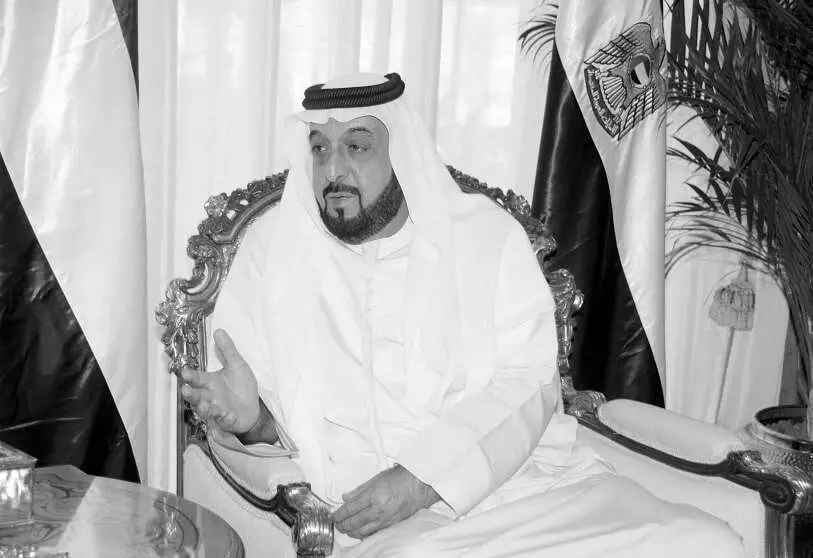Farewell to a key player in the internationalisation and modernisation of the Emirates

The United Arab Emirates (UAE) is a Gulf country with a strong political position on the international scene and with very attractive future prospects due to its booming economy and development in various state and social spheres.
Much of this position is attributed to Sheikh Khalifa bin Zayed al-Nahyan, President of the UAE for the past 18 years until his death today. The late Sheikh was elected president of the state on 3 November 2004, following the death of his father, Sheikh Zayed bin Sultan al-Nahyan, the previous day, and the loss of this prominent figure has come as a blow to the nation, which has instantly expressed both regret and recognition, and has also been a negative development on the international political scene for all that the former president of the Middle Eastern country has brought to the country.
One of the most outstanding values of Khalifa bin Zayed al-Nahyan's administration is that he has been able to develop solid diplomatic relations with the vast majority of the world's countries; ties based on respect, solidarity, commitment and continuous dialogue. A great example of this was the very important role played by the UAE in the fight against the coronavirus pandemic with the enormous material and personal aid it distributed around the world to help many countries in this difficult situation that has hit the entire globe hard over the last two years.
On the other hand, the UAE, under the presidency of Khalifa bin Zayed al-Nahyan, has always been willing to cooperate and promote dialogue and international negotiation to avoid conflicts, with the main objective of promoting peace and stabilising certain hot spots, especially in the Middle East region. Here the Gulf country also played a leading role by participating decisively in the famous Abraham Accords by which several Arab countries established diplomatic relations with Israel in September 2020 under the auspices of the United States, a major political move promoted by the former US administration of Donald Trump that has meant an important step towards the pacification of the Middle East.
The UAE has built up very important international relations that have placed the country in a prominent position in the international arena. Thus, the UAE maintains diplomatic relations with some 200 countries around the world, and there are around 110 embassies and 75 consulates general on its territory. Moreover, thanks to the UAE passport, it is currently possible to enter 165 countries around the world without a visa, as reported by Al-Ain News.
Another great example of international consolidation under the hitherto president is that the UAE recently won a non-permanent seat on the UN Security Council for the second time in its history for the period 2022-2023, and also won membership of the Human Rights Council for the third time from 2022 to 2024.
Under the president's directives, the UAE has also set an example in the pursuit of peace and fraternal coexistence among all countries of the world. An example of this is the promotion of fraternity and human coexistence, which reached its peak with the signing in Emirati territory of the Document of Human Fraternity, which was a great impetus to promote human and religious coexistence in the world thanks to the signing by Pope Francis and the Grand Imam of Al-Azhar, Ahmed al-Tayeb. This text was a declaration of intent in favour of human coexistence and fraternity under the patronage of the highest representatives of the Catholic Church and Islam from around the world. The Emirates was the host country for this meeting and this decisive impulse to the struggle for peace and fraternal coexistence of all humanity and all religions.

Also, Khalifa bin Zayed al-Nahyan always had a broad vision of the Gulf area as a strategic region whose security and stability are linked to the security and stability of the world. As an example of this determination, the UAE has also been deeply involved in recent years in collaboration within the Gulf Cooperation Council (GCC), working in depth on joint efforts among the countries of the region to achieve many goals and realise many inclusive projects.
Under the leadership of Khalifa bin Zayed al-Nahyan, the UAE has always sought to collaborate with other Arab countries to promote regional and national development in the region and to assist militarily in certain Arab causes when required, always with the aim of promoting peace and fighting for justice in the region.
On the other hand, the UAE has undergone great economic and technological development in the last two decades, coinciding with the presidency of Khalifa bin Zayed al-Nahyan. The great step taken by the Emirate in recent times under the patronage of the late president has been to diversify the economy and boost all kinds of sectors, such as tourism, energy, with a major boost to clean and renewable energies, and new technologies, so as not to depend exclusively on oil as a major source of financing.
The modernisation of the country in all areas and technological development have been the focus of the Emirate's presidency in recent years, a great example of this being the great commitment to aerospace development with major projects such as the Al-Amal space probe and its mission launched on the planet Mars.










